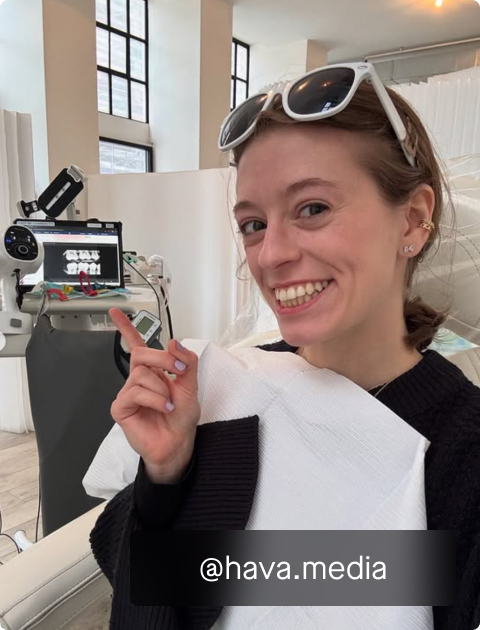Listerine sensitivity? Why some products hurt your teeth.

It's a cruel twist of fate when your teeth become sensitive to your daily dental products. Swish around that mouthwash and arrrrgh 😖 it stings! Apply that toothpaste that's supposed to help with sensitivity and yowza 😵! These products are supposed to keep your teeth healthy, but somehow they are making you cringe instead. What gives?
When your teeth become sensitive, everything including your oral care products can set off that zinging feeling. More than half of US adults have sensitive teeth and fight through cringe-worthy experiences when they eat, care for their teeth, and even breath. Let's unpack what's going on, and how you can address the sensitivity you feel with your dental products.
Act dry mouth rinse, Listerine, or other mouth rinses hurt your teeth? That could be your dentin talking.
Mouth rinses are a great way to help rinse away the extra food particles and bacteria that hang out in your mouth. And if you suffer from dry mouth, mouth rinse can provide much-needed relief. But not all mouth rinses are the same.
Many mouthwashes, like Listerine and Scope, are alcohol-based. The alcohol kills some bacteria (like pouring rubbing alcohol on a scrape) and leaves your mouth feeling sterile, but that same alcohol will also dry out your mouth. And dry mouth causes a host of oral health issues because you don't have enough saliva to wash away bacteria. So that temporary cleanse may end up creating more bacteria in the long run.
Thriving bacteria lead to:
- Increased plaque
- Tooth decay
- Gum disease
- Increased cavities
- Burning mouth syndrome
- and SENSITIVITY 😦 😖 😵
Tooth sensitivity is caused when your dentin - the layer of tooth beneath your enamel, is exposed. Dentin is very porous (like a sponge). When air, liquid, or foods reach the dentin they sneak into the pores and find their way to the sensitive pulp of your tooth. When anything touches the inside of your tooth, the nerves are stimulated and send a "zinging" sensation through the tooth.
Mouthwash for sensitive teeth - what's the best out there?
Our clinicians' favorite mouth rinse is CloSYS. It's an alcohol-free, saliva-neutralizing, bacteria-busting rinse. If you're interested in trying it, we provide a free sample in our starter kits along with other products that are clinically proven to decrease sensitivity.
"CloSYS is highly effective at removing the bacteria responsible for oral health conditions like gum inflammation, bleeding, cavities, and bad breath," explains Wally hygienist, Sarah Clark, RDH. "Rather than mask bad breath with mint flavors, CloSYS actually eliminates the bacterial byproduct that causes bad breath. It's also super gentle which makes it safe and comfortable to use, especially for patients who experience tooth sensitivity."
Let's move onto toothpastes.
Sensodyne for toothache. Makes sense, right?
Ok, you've got a sensitive tooth. You go out and get Sensodyne because, hey, it's name has the word "sensitive" in it so it has to work. You put it on your toothbrush and then say...
Sensodyne makes my teeth hurt!
Even though your teeth hurt when you apply Sensodyne, it doesn't mean that the paste is causing the sensitivity. Pretty much any toothpaste will trigger your sensitivity if your dentin is exposed so don't give up on Sensodyne (or any other new toothpaste) yet. Similar to starting a new workout routine, it takes 2-3 weeks of regular Sensodyne use to start to see a result.
"When my patients start using a new product, I let them know that there is often a fluctuation period for the first 2-3 weeks where their mouth adjusts to the new product," shares Sarah. "In some cases patients may experience an increase in sensitivity, but that's nothing to be alarmed about."
That said, not every product works for every mouth. "If the issue doesn't resolve in 3-4 weeks of using the product properly, it's best to try a different product," says Sarah.
Teeth whitening hurts?
That's your dentin speaking again. Teeth whitening, whether gel in a tray or on a strip, contains ingredients that can cause pain if you have sensitive teeth.
Teeth whitening for sensitive teeth, can I even do it?
If you are motivated to whiten your teeth but are discouraged by your sensitivity, our clinical team has your back. You'll want to get to the root cause of your sensitivity and address. Strong enamel will lead to more effective teeth whitening.
Here are the top tips from our clinical team to address sensitivity:
- Brush at least twice per day with a soft-bristled toothbrush for two minutes to ensure you're scrubbing all the nooks and crannies around the gum line.
- If you use a manual toothbrush, consider upgrading to an electric sonic toothbrush with soft bristles.
- Use appropriate toothpaste and mouth rinses that target enamel restoration and help neutralize acids in your mouth
- Floss or use a water pik daily to keep the spaces between your teeth clean (of course we had to mention this).
- Wear a night guard if you grind or clench your teeth.
If you have tooth sensitivity and want to whiten your teeth, opt for custom-made trays with custom-formulated gels. "This allows you to get the shade you want without the painful sensitivity that comes with in-office or over-the-counter whitening," shares Wally hygienist, Sarah Clark, RDH. That's why custom whitening is included in Wally's dental membership. Join the waitlist if you're interested in a whitening option that works, and won't hurt your wallet or your teeth.
Want to learn more about tooth sensitivity? Check out "Tooth sensitivity: your ultimate guide" for everything you need to know from what causes sensitivity, and what you can do about it.









